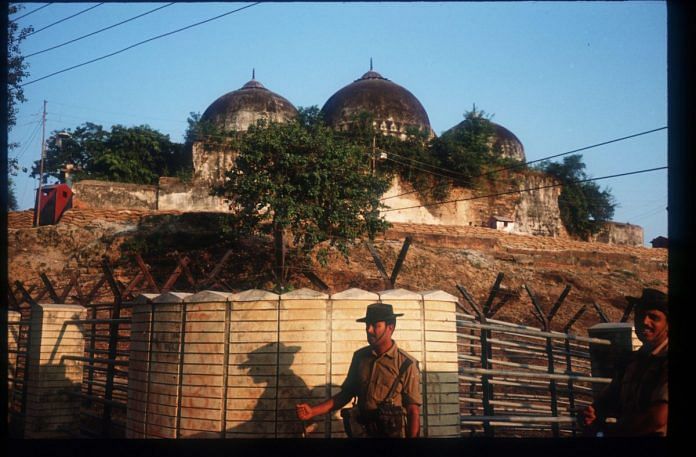Supreme Court clears hurdle in the way of final hearing of Ayodhya land title dispute. Hearings to begin 29 October.
New Delhi: The final hearing in the Ayodhya land dispute case will begin from 29 October after the Supreme Court Thursday cleared the decks by ruling that praying in a mosque is not integral to the practice of Islam.
In a 2:1 ruling, the top court refused to refer its 1994 Ismail Farooqui verdict to a larger bench that said praying in a mosque is not essential for practicing Islam. In the same case, the court allowed acquisition of the disputed 2.77 acres where the Babri Masjid stood before it was pulled down in 1992.
“The present case shall be decided on its own facts, the Ismail Farooqui Judgment would have no impact on it,” Justice Ashok Bhushan who wrote the majority opinion said.
While Chief Justice Dipak Misra agreed with Bhushan, justice Abdul Nazeer wrote a dissenting opinion.
“The contentious observations in Farooqui case have influenced the 2010 Allahabad High Court judgment,” said justice Nazeer referring to the the high court verdict that made a three-way partition of the disputed land in Ayodhya. The apex court is currently hearing appeals against it.
Nazeer held that the question of the importance of a mosque in Islam must be referred to a constitution bench.
On 20 July, the top court had reserved its verdict on the limited issue of whether a mosque is integral to Islam.
During the arguments, the three-judge bench had observed that it would re-examine whether its 1994 Ismail Farooqui judgment needed to be referred to a larger bench.
While holding that offering namaaz or prayers was an essential religious practice, the Ismail Farooqui judgment said “a mosque is not an essential part of the practice of the religion of Islam and namaaz (prayer) by Muslims can be offered anywhere, even in open”.
The 2010 HC judgment
The bench was hearing a batch of pleas challenging the 2010 Allahabad High Court judgment in the title dispute over the land known as the ‘Ram Janmabhoomi’ when the limited issue over the importance of a mosque was raised. The Babri Masjid — which was razed to the ground by karsevaks on 6 December 1992 —was built on a part of this land.
Also read: Babri Masjid case judge moves Supreme Court to unblock his promotion
The 2010 judgment, in a 2:1 majority ruling, had divided the land in three equal parts between the parties — the Sunni Waqf Board, the Nirmohi Akhara and the deity, Ram Lalla.
The Supreme Court bench had said it did not want to issue piecemeal directions and intended to hear the matter — on the limited issue — in its entirety.
What the Muslims said
Senior advocate Rajeev Dhavan — representing the Muslim parties — argued that every place of worship of every religion was entitled to protection against comparative significance. This comparative significance, he said, could not be used to resolve issues involving different faiths.
“The one billion population of India consists of six main ethnic groups and fifty-two major tribes; six major religions and 6,400 castes and sub-castes; eighteen major languages and 1,600 minor languages and dialects,” he said.
“The essence of secularism in India can best be depicted if a relief map of India is made in mosaic, where the aforesaid one billion people are the small pieces of marble that go into the making of a map.
“Each person, whatever his/her language, caste, religion, has his/her individual identity, which has to be preserved so that when pieced together it goes to form a depiction with the different geographical features of India.”
Also read: From faith to politics, new Indian Muslim middle class is different from older Muslim elite
Senior advocate Raju Ramachandran had argued that the matter needed to be referred to a larger bench, owing to the political significance and religious sensitivity of the matter.
What the Hindus said
The Hindus argued that the issue at hand was purely a “property dispute”, and parties could not rely on the religious sensitivities or political importance to refer issues to larger benches.
Representing one of the original plantiffs — Gopal Singh Visharad — senior advocate Harish Salve said a larger bench was not required to hear the issue. The country had moved on from the incidents surrounding the demolition of the 16th century mosque that was built by the Mughal emperor Babar, and now the issue should be solely decided as a land dispute, he had said.




God is everywhere, this is said by all religions. So in a way, no place of worship is “essential”. But the Quran does say that the Muslims should go to a mosque and pray together. In that sense it can be said that a mosque is essential to Islam. Also, prophet Muhammad built a mosque in Madina soon after his arrival from Mecca. (What was called the Hijra). He gave great importance to the construction of a mosque where Muslims could pray in a congregation.